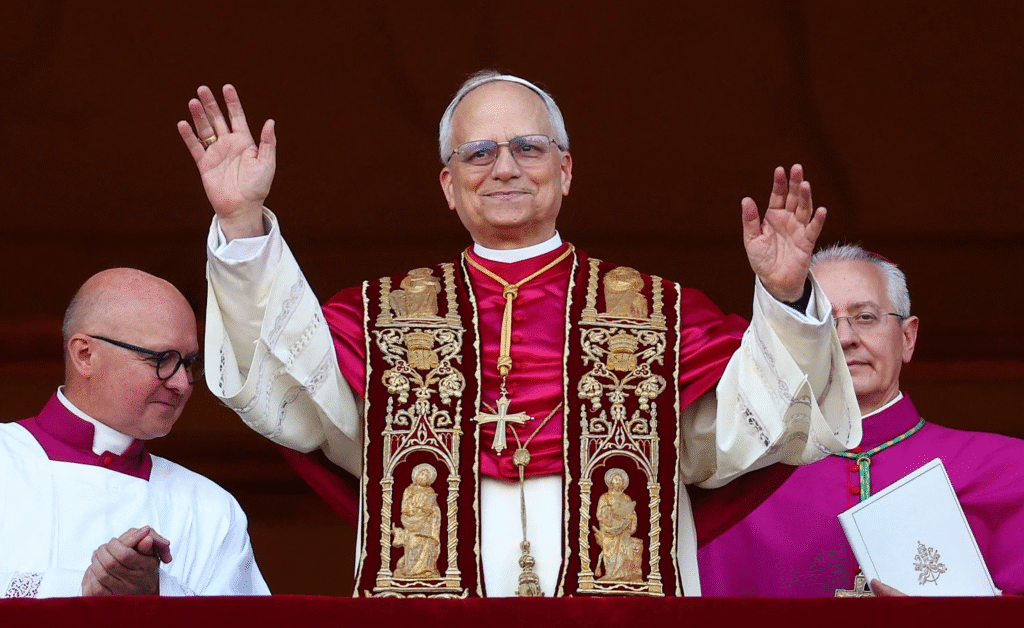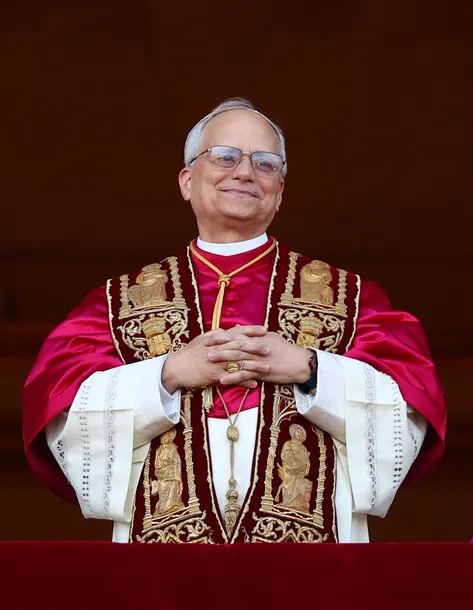
The world stood still as Pope Leo XVI made his first public address, delivering the profound and heartfelt message: “Peace be with you.” These words, simple yet deeply resonant, marked the beginning of a new era for the Catholic Church and for the millions of faithful worldwide who look to the Vatican for spiritual guidance.
The Rise of Pope Leo XVI
Pope Leo XVI’s election was a historic moment for the Catholic Church, bringing a leader known for his humility, intellect, and commitment to interfaith dialogue. Born Giovanni Maria Conti in Naples, Italy, he rose through the ranks of the Church with a reputation for bridging divides and addressing contemporary issues with a fresh perspective rooted in traditional Catholic teachings.
Cardinal Conti’s journey to the papacy reflects a life dedicated to serving others. His years as a bishop in Southern Italy were marked by a focus on uplifting marginalized communities, addressing poverty, and championing education initiatives. His emphasis on dialogue and unity stood out during his tenure in the Curia, where he advocated for collaboration between different faiths and cultures.
Many observers noted his extraordinary ability to connect with people from all walks of life. From spending time in impoverished neighborhoods to engaging in theological discussions with scholars, Cardinal Conti’s pastoral approach was characterized by deep empathy and an unyielding commitment to justice. His election is seen by many as a testament to the Church’s recognition of these qualities and its commitment to addressing modern challenges while staying true to its spiritual roots.
A Message of Peace in a Divided World
“Peace be with you” is not just a greeting; it’s a mission statement for Pope Leo XVI’s papacy. In a world fraught with conflict, division, and uncertainty, these words carry an immense weight. Addressing a global audience, Pope Leo XVI’s message struck a chord with people of all faiths and backgrounds, resonating as a call for reconciliation and unity.
In his first address, delivered from the balcony of St. Peter’s Basilica, the Pope emphasized the importance of understanding and compassion. He called upon the global community to embrace dialogue over discord, cooperation over conflict, and hope over despair. His words were a reminder of the Church’s enduring mission to serve as a beacon of hope and love in a world often overshadowed by strife.
The simplicity of his words was underscored by their profound depth. By choosing a phrase familiar to Catholics and deeply rooted in scripture, Pope Leo XVI managed to communicate a message that transcended religious boundaries. His address was interwoven with themes of forgiveness, mercy, and the urgent need for humanity to come together in these challenging times.
Key Themes in Pope Leo XVI’s Vision
Unity Across Borders
One of the central themes of Pope Leo XVI’s vision is the unity of humanity. He acknowledged the diverse challenges facing the modern world, from economic disparities to environmental crises, and stressed the need for collective action.
“We are called to be stewards of creation, to care for our common home, and to ensure that no one is left behind in our pursuit of progress,” he said during his address. His message echoed the sentiments of his predecessor, Pope Francis, particularly in terms of addressing climate change and promoting sustainable development.
Pope Leo XVI’s emphasis on unity is not limited to the Church but extends to all of humanity. He called upon nations to put aside their differences and work together for the common good. “The divisions we see in our world today are man-made,” he said. “They can be healed if we choose to listen to one another and prioritize our shared humanity.”
Advocacy for the Marginalized
The new pontiff has long been a voice for the voiceless. As a bishop, he was known for his efforts to support refugees and migrants, and he has vowed to continue these efforts as Pope. In his inaugural speech, he reaffirmed his commitment to addressing the plight of the marginalized, urging nations to prioritize compassion and humanity in their policies.
“The Gospel teaches us to care for the least among us,” he declared. “It is our sacred duty to ensure that the hungry are fed, the homeless are sheltered, and the oppressed are given justice.” This commitment is expected to shape his policies and initiatives in the Vatican, as well as his interactions with global leaders.
His past work as a bishop highlights his ability to translate these ideals into actionable steps. From establishing food banks and education programs to advocating for affordable housing, Pope Leo XVI’s legacy is one of tangible results. As Pope, he has the potential to expand these efforts on a global scale, inspiring Catholics and non-Catholics alike to join in the fight against poverty and inequality.
Emphasis on Interfaith Dialogue
Recognizing the interconnectedness of today’s world, Pope Leo XVI has placed interfaith dialogue at the heart of his papacy. He highlighted the importance of building bridges between religions, fostering mutual respect, and finding common ground to work towards peace.

“Faith can be a source of division, but it is also a profound source of unity,” he remarked. “By understanding and respecting each other’s beliefs, we pave the way for a more harmonious world.” This commitment to interfaith dialogue is particularly significant in a time when religious tensions often dominate headlines.
Pope Leo XVI’s actions have already reflected this priority. In his first week as Pope, he held meetings with leaders from various religious communities, including representatives from Islam, Judaism, Hinduism, and Buddhism. These gestures have been widely praised as a sign of his genuine commitment to fostering global understanding and cooperation.
Reactions From Around the Globe
The election of Pope Leo XVI and his inaugural message have elicited reactions from leaders and communities worldwide. Religious leaders from various faiths welcomed his call for unity and peace, expressing hope for collaborative efforts under his leadership.
World leaders, including heads of state and diplomats, have also extended their congratulations. Many highlighted the significance of his message in addressing global challenges such as climate change, inequality, and conflicts. The Pope’s focus on inclusivity and dialogue has been particularly praised as a timely and necessary approach in today’s polarized world.
Among the faithful, there has been an overwhelming sense of hope and optimism. Pilgrims gathered in St. Peter’s Square described the moment as “inspiring” and “deeply moving.” Social media platforms have been flooded with messages of support, as Catholics and non-Catholics alike share their reflections on the Pope’s first address.
Challenges Ahead
As the new leader of the Catholic Church, Pope Leo XVI faces a complex set of challenges. Internally, he inherits an institution grappling with calls for reform, addressing past scandals, and adapting to the needs of a modern, diverse congregation. Externally, the Church’s voice is needed more than ever to address global issues, from poverty to climate change to geopolitical tensions.
The Pope’s emphasis on peace and dialogue provides a strong foundation, but implementing these ideals will require significant effort and collaboration. Observers and analysts have noted that his success will depend on his ability to inspire both the clergy and the laity to actively participate in his vision for a more unified and compassionate world.
One of the immediate challenges will be addressing the Church’s role in tackling the ongoing refugee crisis. Pope Leo XVI has been a vocal advocate for humane immigration policies and equitable treatment of displaced persons. His papacy is expected to put a spotlight on these issues, urging governments to adopt more compassionate approaches.
The Papal Agenda
In the coming months, Pope Leo XVI is expected to outline a comprehensive agenda for his papacy. Key priorities are likely to include:
- Strengthening the Church’s role in global humanitarian efforts.
- Addressing the needs of young Catholics and fostering their engagement with faith.
- Promoting environmental sustainability in line with the teachings of his predecessors.
- Deepening relationships with other religious communities to foster global peace.
Pope Leo XVI’s agenda will likely draw on his extensive experience as a bishop and cardinal, as well as his deep understanding of the challenges facing the Church and the world today. He is expected to leverage his strong communication skills and ability to connect with people to mobilize action on a range of critical issues.
The Legacy of Pope Leo XVI’s First Words
“Peace be with you” has already become a rallying cry for hope and unity. These words are expected to shape the narrative of Pope Leo XVI’s tenure and inspire millions to work towards a shared vision of peace.
The Pope’s message serves as a reminder that peace begins with individual actions and choices. Whether through acts of kindness, efforts to understand others, or contributions to community-building initiatives, every person has a role to play in creating a more harmonious world. His words challenge us to look beyond our differences and focus on what unites us as human beings.
A Global Call to Action
As Pope Leo XVI embarks on his journey as the spiritual leader of over a billion Catholics, his call for peace transcends religious boundaries. It is a universal appeal to the conscience of humanity, urging each person to strive for a world marked by compassion, justice, and unity.
The historic moment of his election and his inaugural address will undoubtedly be remembered as a turning point for the Catholic Church and for global efforts towards peace. With his words echoing in the hearts of millions, Pope Leo XVI has set the stage for a papacy defined by hope, courage, and unwavering commitment to the greater good.
By choosing the words “Peace be with you” as the foundation of his first message, Pope Leo XVI has signaled a clear intention to prioritize harmony, understanding, and the betterment of humanity. His papacy holds the promise of a brighter future, rooted in faith, guided by compassion, and dedicated to the service of all.

